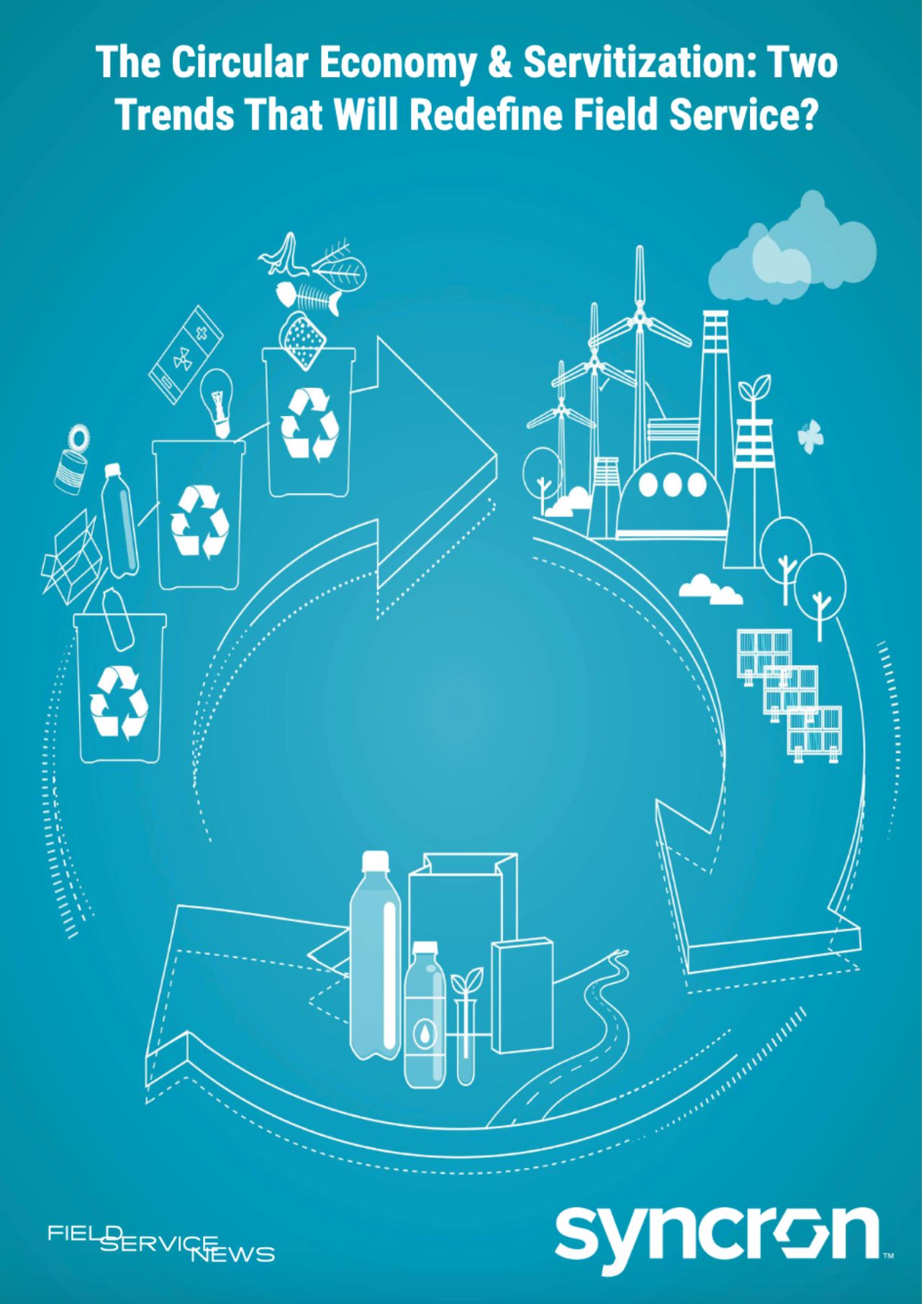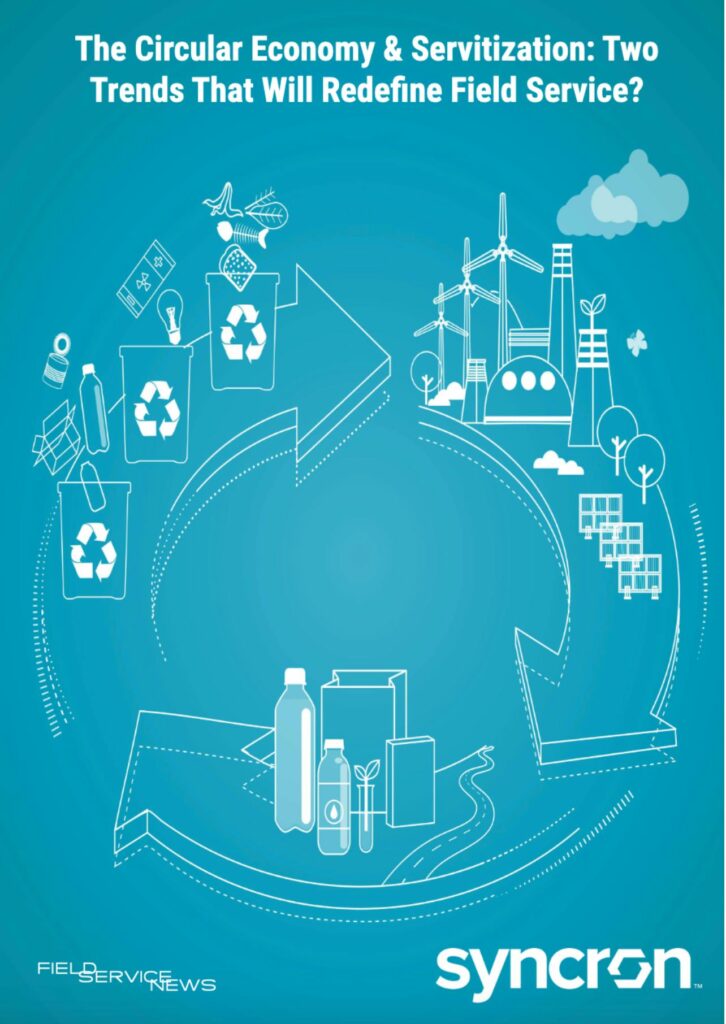Challenges and Opportunities for Field Service Organizations to Adopt Circular Economy and Servitization Practices
Challenges and Opportunities for Field Service Organizations to Adopt Circular Economy and Servitization Practices
As we’ve seen in the previous features, adopting circular economy and servitization practices presents significant opportunities for field service organizations to create more sustainable and profitable business models.
However, it’s also crucial to recognize that implementing these practices presents challenges that must be addressed and overcome. In this feature, we’ll explore some challenges and opportunities that field service organizations may face when adopting circular economy and servitization practices.
Shifting from Reactive Maintenance to Proactive Maintenance and Product Optimization
One of the critical challenges that field service organizations may face when adopting circular economy and servitization practices is shifting their focus from reactive maintenance to proactive maintenance and product optimization.
Traditional field service models have often focused on repairing products only when they break down rather than taking a proactive approach to maintenance and optimization. However, in a circular economy model, it’s essential to maximize the lifespan of products to reduce waste and optimize resource use.
Field service organizations may need to invest in new technologies, such as predictive maintenance and analytics, to take a proactive approach to maintenance and optimization. By analyzing data on product usage, performance, and wear and tear, field service organizations can identify opportunities to optimize products for longevity and sustainability, reducing the need for reactive maintenance and repair.
Indeed, it’s important to note that while moving from reactive to proactive maintenance doesn’t require servitization or a circular economy, it can be deemed an important step in the same direction. There is certainly, a correlation between the approaches, if not necessarily causation.
Transitioning from Selling Products to Offering Services
Another challenge that field service organizations may face when adopting circular economy and servitization practices is transitioning from selling products to offering services. This shift requires a fundamental change in the business model, from one based on selling products to one based on providing ongoing services and solutions.
To make this transition successful, field service organizations may need to invest in new skills and capabilities, such as service design and service delivery. They may also need to develop new pricing models that align with a service-based model, such as offering subscription-based services or performance-based contracts.
Leveraging Data and Analytics to Optimize Products for Longevity and Sustainability
Field service organizations may face challenges in leveraging data and analytics to optimize products for longevity and sustainability. While data and analytics can provide valuable insights into product usage and performance, field service organizations may lack the expertise and resources to analyze and act on this data effectively.
To overcome this challenge, field service organizations may need to invest in new technologies and partnerships to help them leverage data and analytics more effectively. This may include partnering with data analytics firms, investing in machine learning and AI capabilities, or developing in-house data analysis and optimization expertise.


Data usage note: By accessing this content you consent to the contact details submitted when you registered as a subscriber to fieldservicenews.com to be shared with the listed sponsor of this premium content Syncron who may contact you for legitimate business reasons to discuss the content of this briefing report.
This content is available for FSN PRO members and also for a limited period for FSN FREE members. Please make sure you are logged in to access this content.
Not yet subscribed? Instantly unlock this content and more on our forever-free subscription tier FSN FREE
Join FSN FREE today!
Subscribe to our forever-free subscription tier FSN FREE by completing the brief form below and get instant access to this resource plus a selection of premium resources every month.
[pmpro_signup submit_button="Get access now!" level="1" redirect="referrer" custom_fields="true" short="true"]
Some browsers may not support our quick-register pop up function. If you cannot see a red button above this message then click here to head to the FSN FREE registration page instead.
"While the shift towards a circular economy and servitization presents significant challenges for field service organizations, it also offers tremendous opportunities for innovation and growth...”
Challenges to Traditional Revenue Streams
Servitization involves a shift towards providing services rather than simply selling products, which can create new revenue streams for companies. However, this shift can also challenge traditional revenue streams, particularly spare parts revenue. Similarly, the circular economy, which aims to keep resources in use for as long as possible, often involves using recycled and refurbished parts rather than purchasing new parts.
This challenges field service organizations that rely on spare parts revenue to sustain their business. According to research, spare parts can make up 70% of service revenues on average among manufacturers. However, companies can open new revenue streams and create more sustainable business models by embracing the circular economy and servitization.
To address this challenge, field service organizations can explore new revenue models that align with the circular economy and servitization principles. For example, companies can consider offering repair services and refurbishing parts to extend the lifespan of products. Additionally, companies can explore new pricing models that incentivize customers to purchase products with longer lifespans and lower maintenance costs.
Another solution is to embrace digital technologies that enable more efficient service delivery and reduce the need for spare parts. For example, predictive maintenance algorithms can help field service technicians detect potential issues before they become significant problems, reducing the need for costly spare parts replacements.
This can also help field service organizations shift their focus from reactive maintenance to proactive maintenance and product optimization, further extending the lifespan of products and reducing waste.
Finally, field service organizations can explore new partnerships and collaborations to support their circular economy and servitization initiatives. By partnering with suppliers, customers, and other stakeholders, field service organizations can create closed-loop supply chains that enable the reuse and recycling of products and materials. This can help organizations reduce waste and maximize the value of resources while also creating new revenue streams and business opportunities.
Conclusion
While the shift towards a circular economy and servitization presents significant challenges for field service organizations, it also offers tremendous opportunities for innovation and growth. By taking a proactive approach to maintenance and optimization, transitioning from selling products to offering services, leveraging data and analytics effectively, and exploring new revenue models and partnerships, field service organizations can create more sustainable and profitable business models that benefit their bottom line and the planet.
By embracing the circular economy and servitization, field service organizations can drive significant innovation in the industry and become leaders in the transition towards a more sustainable future.

Do you want to know more?
If you are already a subscriber you can access the report instantly on the ‘read now’ button below. If the button is not showing and you are already a subscriber then please log-in and refresh this page.
Not yet subscribed? Instantly unlock this content and more on our forever-free subscription tier FSN FREE
Join FSN FREE today!
Subscribe to our forever-free subscription tier FSN FREE by completing the brief form below and get instant access to this resource plus a selection of premium resources every month.
[pmpro_signup submit_button="Get access now!" level="1" redirect="referrer" custom_fields="true" short="true"]
Some browsers may not support our quick-register pop up function. If you cannot see a red button above this message then click here to head to the FSN FREE registration page instead.

 Data usage note: By accessing this content you consent to the contact details submitted when you registered as a subscriber to fieldservicenews.com to be shared with the listed sponsor of this premium content Syncron who may contact you for legitimate business reasons to discuss the content of this briefing report.
Data usage note: By accessing this content you consent to the contact details submitted when you registered as a subscriber to fieldservicenews.com to be shared with the listed sponsor of this premium content Syncron who may contact you for legitimate business reasons to discuss the content of this briefing report.


